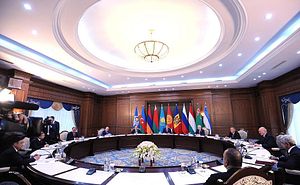Publics across Eurasia view corruption as a significant problem. A new report from Transparency International, based on surveys of nearly 60,000 people spread across 42 countries in Europe and Central Asia, found that one in three people thought corruption was one of the biggest problems in their country.
Transparency International’s Global Corruption Barometer is an annual report that analyzes the responses to a worldwide survey of people and their experiences with corruption. There are several regional reports, with the Europe and Central Asian report the most recently released.
The latest report lays out some top-level trends: politicians and state officials are seen as the most corrupt; many believe the wealthy have “undue influence” in government decisions; and fear keeps people from reporting corruption even as “speaking up” is seen as the best way to fight corruption.
The perception of corruption and identification of specific problems varies between the European Union, the so-called accession countries, and the states of the former Soviet Union, the Commonwealth of Independent States (CIS).
For example, CIS countries suffer from higher rates of bribery than the EU, with Tajikistan taking the bribery crown: 50 percent of responding households reported paying a bribe to access a basic public service in the previous year. Tajikistan also had the highest rate of households — 64 percent — reporting paying a bribe to road police.
Looking just at the CIS countries we cover most often here (sorry Ukraine and Moldova, that’s the five Central Asian states plus Russia), Kyrgyzstan had the highest percentage (47 percent) of people responding that corruption was one of the state’s top three problems. Only 18 percent of Tajiks responded that “corruption/bribery” was one of their country’s three biggest problems.
Tajiks responded that bribery was not a top three problem in the country even as they overwhelming said they’d paid bribes for basic public services and to police on the road. Tajiks may experience corruption on a day-to-day basis but they do not view it as as big a problem when listed next to the other options in the survey: economy, unemployment, crime, immigration, health, education. It’s worth pointing out that corruption is the problem of problems: every single one of the key issues listed in the survey are negatively impacted by corrupt practices.
Kyrgyzstan appears highly on listings of those saying “most” or “all” members of parliament are corrupt (50 percent), and that the government is “very bad” or “bad” at fighting corruption (57 percent). On both questions, Tajikistan doesn’t appear on the listings at all.
Some of this likely stems from differing acceptance levels for whistleblowing and discussing corruption publicly. The report notes that “a lack of social acceptance is another barrier to more people reporting corruption.” The CIS had the lowest percentage of people who “strongly agree” or “agree” that “In our society it is generally acceptable for people to report a case of corruption they witness.”
While the data for Central Asia is not broken out, there’s another clue in the citizen scorecard graphic, which summarized public sentiments about government anti-corruption performance and corruption risks across five core questions — is corruption one of the biggest problems facing the country? How is the government doing at fighting corruption? How corrupt are MPs? How many people paid a bribe? Is it socially acceptable to report corruption?
Aggregated, the CIS responded that corruption is a medium risk, but rated government anti-corruption performance and MP corruption negatively; paid bribes in high percents; and responded negatively to the social acceptability question. Kazakhstan listed corruption as a high risk, gave the government a mediocre grade on anti-corruption performance and was either not asked about MP corruption or had too many “I don’t know” responses to get a listing — in the other categories Kazakhstan matched the CIS aggregate. Kyrgyzstan also bucked the CIS trend and listed corruption as a high risk, but Kyrgyz had a better view than the aggregate CIS regarding acceptability of reporting corruption. Tajikistan wasn’t included on the scorecard.
































